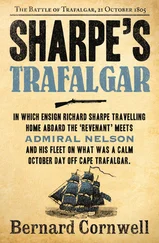Bernard Cornwell - Sharpe’s Triumph - The Battle of Assaye, September 1803
Здесь есть возможность читать онлайн «Bernard Cornwell - Sharpe’s Triumph - The Battle of Assaye, September 1803» — ознакомительный отрывок электронной книги совершенно бесплатно, а после прочтения отрывка купить полную версию. В некоторых случаях можно слушать аудио, скачать через торрент в формате fb2 и присутствует краткое содержание. Жанр: unrecognised, на английском языке. Описание произведения, (предисловие) а так же отзывы посетителей доступны на портале библиотеки ЛибКат.
- Название:Sharpe’s Triumph: The Battle of Assaye, September 1803
- Автор:
- Жанр:
- Год:неизвестен
- ISBN:нет данных
- Рейтинг книги:4 / 5. Голосов: 1
-
Избранное:Добавить в избранное
- Отзывы:
-
Ваша оценка:
- 80
- 1
- 2
- 3
- 4
- 5
Sharpe’s Triumph: The Battle of Assaye, September 1803: краткое содержание, описание и аннотация
Предлагаем к чтению аннотацию, описание, краткое содержание или предисловие (зависит от того, что написал сам автор книги «Sharpe’s Triumph: The Battle of Assaye, September 1803»). Если вы не нашли необходимую информацию о книге — напишите в комментариях, мы постараемся отыскать её.
Sharpe’s Triumph: The Battle of Assaye, September 1803 — читать онлайн ознакомительный отрывок
Ниже представлен текст книги, разбитый по страницам. Система сохранения места последней прочитанной страницы, позволяет с удобством читать онлайн бесплатно книгу «Sharpe’s Triumph: The Battle of Assaye, September 1803», без необходимости каждый раз заново искать на чём Вы остановились. Поставьте закладку, и сможете в любой момент перейти на страницу, на которой закончили чтение.
Интервал:
Закладка:
‘Yesterday,’ Dodd declaimed, ‘the British crossed our frontier! Tomorrow their army will be here at Ahmednuggur, and soon we shall fight them in a great battle!’ He had decided not to say that the battle would be fought well north of the city, for that might discourage the listening civilians. ‘We shall drive them back to Mysore. We shall teach them that the army of Scindia is greater than any of their armies. We shall win!’ The soldiers smiled at his confidence. ‘We shall take their treasures, their weapons, their land and their women, and those things will be your reward if you fight well. But if you fight badly, you will die.’ That phrase sent a shudder through the four white-coated ranks. ‘And if any of you prove to be cowards,’ Dodd finished, ‘I shall kill you myself.’
He let that threat sink in, then abruptly ordered the regiment back to its duties before summoning Joubert to follow him up the red stone steps of the city wall to where Arab guards stood behind the merlons ranged along the firestep. Far to the south, beyond the horizon, a dusky cloud was just visible. It could have been mistaken for a distant rain cloud, but Dodd guessed it was the smear of smoke from the British campfires. ‘How long do you think the city will last?’ Dodd asked Joubert.
The Frenchman considered the question. ‘A month?’ he guessed.
‘Don’t be a fool,’ Dodd snarled. He might want the loyalty of his men, but he did not give a fig for the good opinion of its two European officers. Both were Frenchmen and Dodd had the usual Englishman’s opinion of the Frogs. Good dancing masters, and experts in tying a stock or arranging lace to fall prettily on a uniform, but about as much use in a fight as spavined lapdogs. Lieutenant Sillière, who had followed Joubert to the firestep, was tall and looked strong, but Dodd mistrusted a man who took such care with his uniform and he could have sworn he detected a whiff of lavender water coming from the young Lieutenant’s carefully brushed hair. ‘How long are the city walls?’ he asked Joubert.
The Captain thought for a moment. ‘Two miles?’
‘At least, and how many men in the garrison?’
‘Two thousand.’
‘So work it out, Monsewer,’ Dodd said. ‘One man every two yards? We’ll be lucky if the city holds for three days.’ Dodd climbed to one of the bastions from where he could stare between the crenellations at the great fort which stood close to the city. That two-hundred-year-old fortress was an altogether more formidable stronghold than the city, though its very size made it vulnerable, for the fort’s garrison, like the city’s, was much too small. But the fort’s high wall was faced by a big ditch, its embrasures were crammed with cannon and its bastions were high and strong, although the fort was worth nothing without the city. The city was the prize, not the fort, and Dodd doubted that General Wellesley would waste men against the fort’s garrison. Boy Wellesley would attack the city, breach the walls, storm the gap and send his men to slaughter the defenders in the rat’s tangle of alleys and courtyards, and once the city had fallen the redcoats would hunt for supplies that would help feed the British army. Only then, with the city in his possession, would Wellesley turn his guns against the fort, and it was possible that the fort would hold the British advance for two or three weeks and thus give Scindia more time to assemble his army, and the longer the fort held the better, for the overdue rains might come and hamper the British advance. But of one thing Dodd was quite certain: as Pohlmann had said, the war would not be won here, and to William Dodd the most important thing was to extricate his men so that they could share that victory. ‘You will take the regiment’s guns and three hundred men and garrison the north gate,’ Dodd ordered Joubert.
The Frenchman frowned. ‘You think the British will attack in the north?’
‘I think, Monsewer, that the British will attack here, in the south. Our orders are to kill as many as we can, then escape to join Colonel Pohlmann. We shall make that escape through the north gate, but even an idiot can see that half the city’s inhabitants will also try to escape through the north gate and your job, Joubert, is to keep the bastards from blocking our way. I intend to save the regiment, not lose it with the city. That means you open fire on any civilian who tries to leave the city, do you understand?’ Joubert wanted to argue, but one look at Dodd’s face persuaded him into hasty agreement. ‘I shall be at the north gate in one hour,’ Dodd said, ‘and God help you, Monsewer, if your three hundred men are not in position.’
Joubert ran off. Dodd watched him go, then turned to Sillière. ‘When were the men last paid?’
‘Four months ago, sir.’
‘Where did you learn English, Lieutenant?’
‘Colonel Mathers insisted we speak it, sir.’
‘And where did Madame Joubert learn it?’
Sillière gave Dodd a suspicious glance. ‘I would not know, sir.’
Dodd sniffed. ‘Are you wearing perfume, Monsewer?’
‘No!’ Sillière blushed.
‘Make sure you never do, Lieutenant. And in the meantime take your company, find the Killadar, and tell him to break open the city treasury. If you have any trouble, break the damn thing open yourself with one of our guns. Give every man three months’ pay and load the rest of the money on pack animals. We’ll take it with us.’
Sillière looked astonished at the order. ‘But the Killadar, Monsieur…’ he began.
‘The Killadar, Monsewer, is a wretched little man with the balls of a mouse! You are a soldier. If we don’t take the money, the British will get it. Now go!’ Dodd shook his head in exasperation as the Lieutenant went. Four months without pay! There was nothing unusual in such a lapse, but Dodd disapproved of it. A soldier risked his life for his country, and the least his country could do in return was pay him promptly.
He walked eastwards along the firestep, trying to anticipate where the British would site their batteries and where they would make a breach. There was always a chance that Wellesley would pass by Ahmednuggur and simply march north towards Scindia’s army, but Dodd doubted the enemy would choose that course, for then the city and fort would lie athwart the British supply lines and the garrison could play havoc with the convoys carrying ammunition, shot and food to the redcoats.
A small crowd was gathered on the southernmost ramparts to gaze towards the distant cloud that betrayed the presence of the enemy army. Simone Joubert was among them, sheltering her face from the westering sun with a frayed parasol. Dodd took off his cocked hat. He always felt oddly awkward with women, at least white women, but his new rank gave him an unaccustomed confidence. ‘I see you have come to observe the enemy, Ma’am,’ he said.
‘I like to walk about the walls, Major,’ Simone answered, ‘but today, as you see, the way is blocked with people.’
‘I can clear a path for you, Ma’am,’ Dodd offered, touching the gold hilt of his new sword.
‘It is not necessary, Major,’ Simone said.
‘You speak good English, Ma’am.’
‘I was taught it as a child. We had a Welsh governess.’
‘In France, Ma’am?’
‘In the Île de France, Monsieur,’ Simone said. She was not looking at Dodd as she spoke, but staring into the heat-hazed south.
‘Mauritius,’ Dodd said, giving the island the name used by the British.
‘The Île de France, Monsieur, as I said.’
‘A remote place, Ma’am.’
Simone shrugged. In truth she agreed with Dodd. Mauritius was remote, an island four hundred miles east of Africa and the only decent French naval base in the Indian Ocean. There she had been raised as the daughter of the port’s captain, and it was there, at sixteen, that she had been wooed by Captain Joubert who was on passage to India where he had been posted as an adviser to Scindia. Joubert had dazzled Simone with tales of the riches that a man could make for himself in India, and Simone, bored with the small petty society of her island, had allowed herself to be swept away, only to discover that Captain Joubert was a timid man at heart, and that his impoverished family in Lyons had first claim on his earnings, and whatever was left was assiduously saved so that the Captain could retire to France in comfort. Simone had expected a life of parties and jewels, of dancing and silks, and instead she scrimped, she sewed and she suffered. Colonel Pohlmann had offered her a way out of poverty, and now she sensed that the lanky Englishman was clumsily attempting to make the same offer, but Simone was not minded to become a man’s mistress just because she was bored. She might for love, and in the absence of any love in her life she was fighting an attraction for Lieutenant Sillière, although she knew that the Lieutenant was almost as worthless as her husband and the dilemma was making her think that she was going mad. She wept about it, and the tears only added to her self-diagnosis of insanity. ‘When will the British come, Major?’ she asked Dodd.
Читать дальшеИнтервал:
Закладка:
Похожие книги на «Sharpe’s Triumph: The Battle of Assaye, September 1803»
Представляем Вашему вниманию похожие книги на «Sharpe’s Triumph: The Battle of Assaye, September 1803» списком для выбора. Мы отобрали схожую по названию и смыслу литературу в надежде предоставить читателям больше вариантов отыскать новые, интересные, ещё непрочитанные произведения.
Обсуждение, отзывы о книге «Sharpe’s Triumph: The Battle of Assaye, September 1803» и просто собственные мнения читателей. Оставьте ваши комментарии, напишите, что Вы думаете о произведении, его смысле или главных героях. Укажите что конкретно понравилось, а что нет, и почему Вы так считаете.












